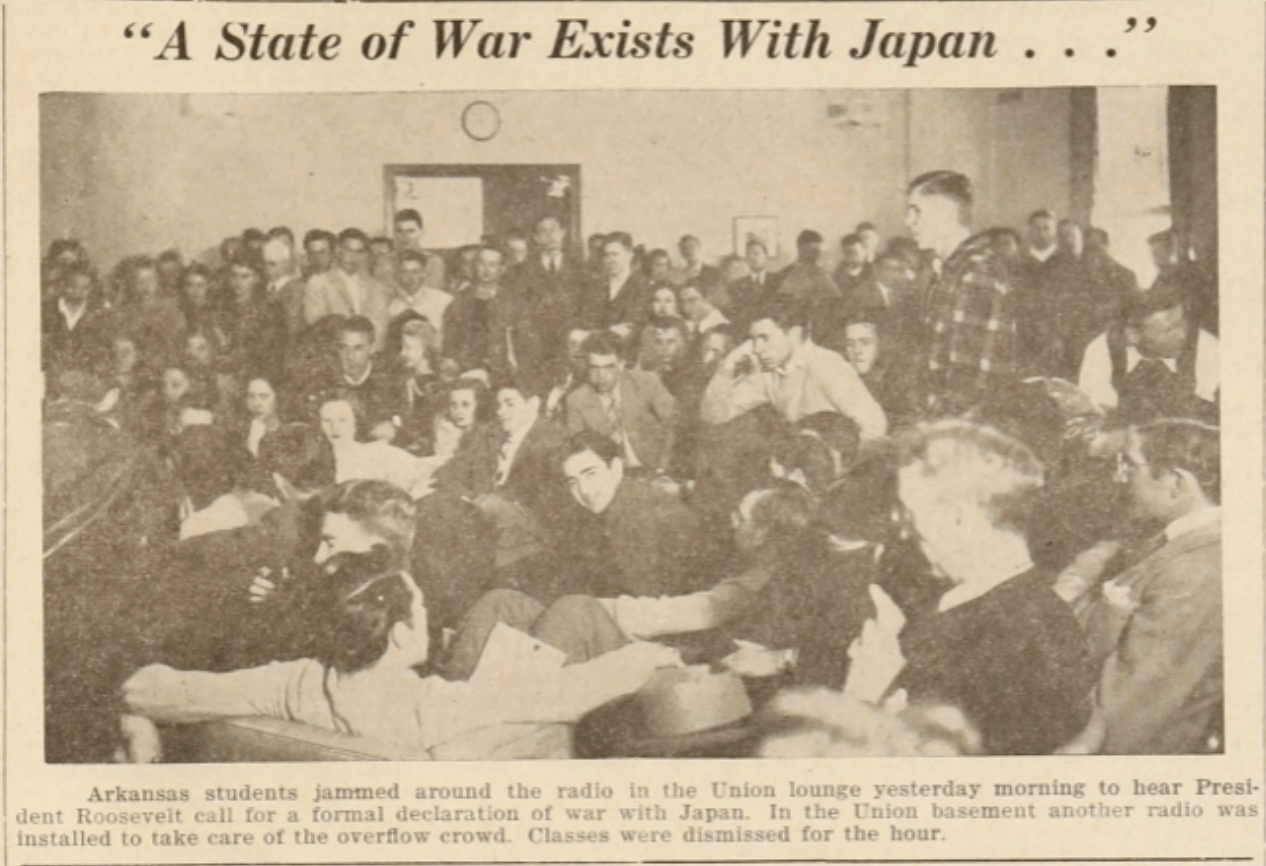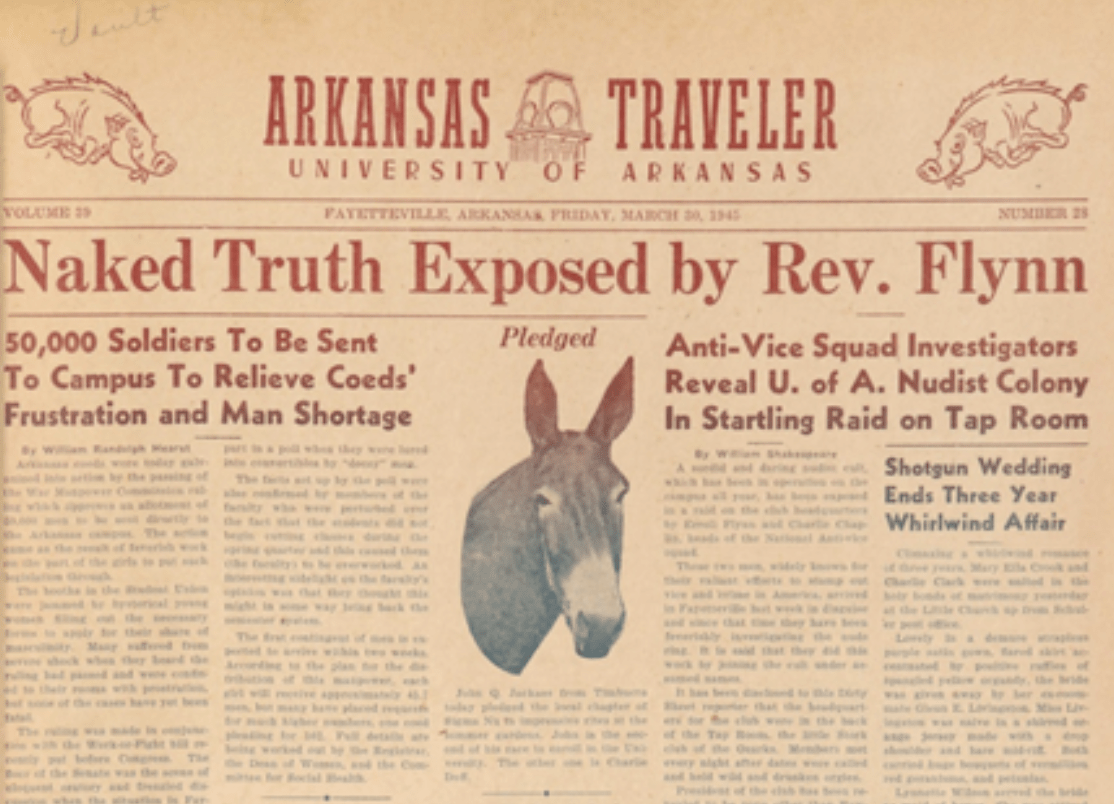
Gathered around a radio in the Student Union, the front page of the Arkansas Traveler on December 9th, 1941 showed students listening to the President declare war on Japan. Photo courtesy of Digital Collections, University of Arkansas.
Author Bio: Emily Snyder is a junior Honors College Fellow majoring in history and minoring in Spanish. Originally from Bentonville, AR, Emily is involved on campus as a member of the University of Arkansas Museum Student Advisory Council, an Honors College Ambassador, and a member of Phi Alpha Theta. After college, Emily hopes to pursue a graduate degree in museum and archival studies, and eventually work to connect underrepresented communities with museum services.
December 8th, 1941 found University of Arkansas students in the Student Union, gathered around a radio to hear President Roosevelt’s formal declaration of war on Japan after the devastating bombing of Pearl Harbor the previous day. But even before the formal declaration, students could feel the war time tensions on their campus and sought ways to cope with the stress the great crisis brought. They found relief the same way that humans have coped with seemingly insurmountable difficulties throughout time: humor. The Arkansas Traveler, the University’s student newspaper, had a tradition at the time of releasing a humorous edition for April Fools Day. Once World War I began however, the April Fools edition took on a new purpose as the staff voiced the fears and frustrations of students through absurdism and satire. On April 1st, 1941, the main headline proclaimed, “Army Takes Over University,” and proceeded to account a fake letter from Secretary of War Knox about needing the campus to hold overflow troops. Little did they realize that when the United States did enter the war, the University would have a housing crisis as the need for a temporary camp for veterans and their families arose. Later on, the edition boasts that Gypsy Rose Lee, a strip-tease dancer, will be performing at the University and that escalators will be installed in Old Main. These claims never came to pass, much to the dismay of some students I am sure.
Both the April 1st, 1943 and 1945, the papers had headlines that expressed the female students’ exasperation over missing men. In 1943, the headline read “Cadets Kidnapped by U. of A. Women Led by Lawrence: Soldiers Quit Arkansas University Post for Overseas Duty, Screaming They ‘Can’t Stand Female Attacks.” The April 1, 1945 edition makes it clear that services were needed closer to home with the headline “50,000 Soldiers to be Sent to Campus to Relieve Coeds’ Frustration and Man Shortage.” This story begins a raunchy publication said to be headed by the editor Adolph Hitler. The female students were dealing with more than just a lack of physical intimacy though, and I believe that these articles were their way of managing the distress they were feeling. They were constantly faced with the reality that their brothers, their significant others, and their friends were off fighting a war and might never come back. Many other editions of the Traveler throughout the years of the war listed students who had died fighting. The students left on campus threw themselves into supporting the war effort any way they could, especially by having war loan drives. By participating in these types of activities at home they were supporting their loved ones overseas in the ways they could.

“Anti-Vice Squad Investigators Reveal U. of A. Nudist Colony…” is one of the many scandolous article titles of the 1945 April Fools edition of the Arkansas Traveler. Photo courtesy of Digital Collections, University of Arkansas
Humor has such an impact on humans because it allows us to psychologically change our perspectives. When something is funny and we laugh, it can offset our stress hormones. It can be seen in the ways that people have and still are coping when they encounter a crisis. Take the COVID-19 pandemic. All over the internet there are examples of people taking the situation we now find ourselves in and using humor to cope with the new normal. As graduations were cancelled and the last months of classes were done virtually, the meme of having graduated from Zoom university arose. A helpful diagram on hand washing quickly became a way for people to change the steps to their own absurd thoughts. The brand of beer Corona quickly became the punchline to many jokes. These stressful aspects of the pandemic were altered to become things that could be laughed at. When people can conceptualize something in a humorous manner, it loses its power to hold them in fear and creates a way to deal with reality.

The hand-washing technique diagram was one of the many memes that came out of the COVID-19 pandemic.
Just as students during these bizarre times have faced many challenges and changes to their ways of life, attending their classes online and unable to have graduations, students during World War II grappled with similar disappointments. They had their day of celebration for their graduation cancelled, they had to register for sugar rations, and they had to deal with the knowledge that many of their loved ones were risking their lives every day. The most striking similarity between their situation and ours I found however was the resiliency displayed by humans facing uncertain times: the ability to cope by looking at the calamity head on and finding a way to laugh about it.
Sources:
University of Arkansas Digital Collections, Arkansas Traveler Collection. https://digitalcollections.uark.edu/digital/collection/Traveler
